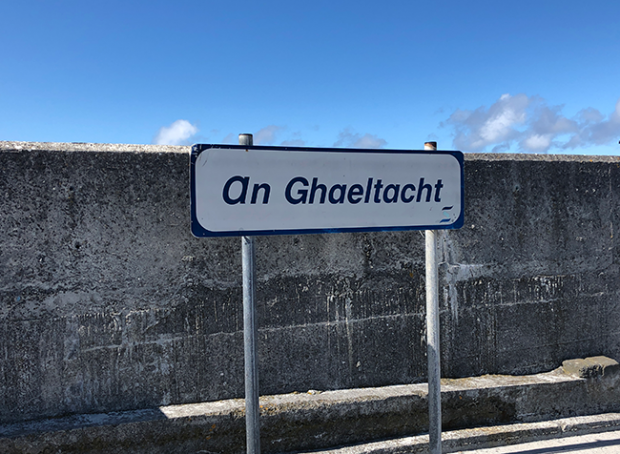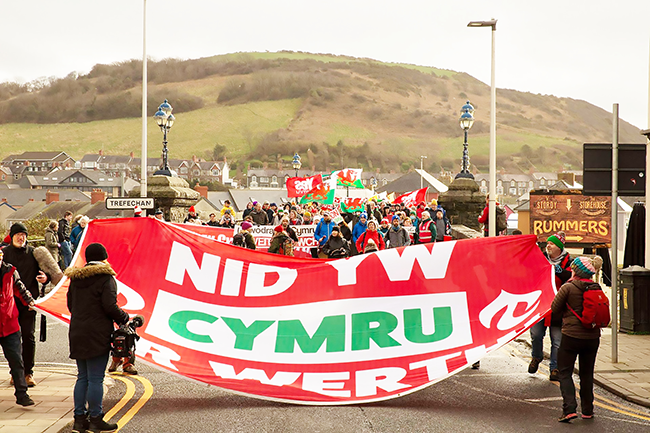24 November 2022 Edition
Our Gaeltacht communities are in crisis

Neoliberalism has caused the Gaeltacht’s woes – it must be challenged to ensure a future for Irish throughout Ireland
It is surely unnecessary to inform the readers of An Phoblacht that current provision for the Irish language on either side of the border needs improving. Even those with only a casual interest in the heritage language of the island will likely be aware that the number of Gaelscoileanna is nowhere near sufficient to meet demand or that provision of classes for adult learners of Irish is pitiful in most areas.
This is the opposite of the situation in Wales, where I lived for the last two years while teaching Celtic Studies and language revitalisation in Aberystwyth University. Welsh-medium schools abound throughout Wales and a government-funded body offers adults a systematic curriculum progressing from complete beginner to fluent speaker, allowing me to reach a high enough level to lecture through Welsh after just one (intense!) year of study.
These classes are provided at nominal cost – and free for under-25s and teachers – and available to suit all schedules. While colonial oppression operated in Ireland on a level that Wales never experienced (thus leaving their language community much more intact), there are certainly valuable lessons to learn from the Welsh. Indeed, many of these lessons have clearly been noted by groups such as An Dream Dearg, who have driven recent language rights developments in the North through their tireless grassroots organising.
Important as an Irish language act for the North, Irish-medium schools and classes for adults all are, language revitalisation, however, should firstly be about maintaining sustainable communities with high densities of speakers, as many leading figures in the field have explained. This understanding stems from an appreciation of the fact that losing the geographic strongholds of a minoritised language makes everything else we might to do revitalise it much, much more difficult and is a key step towards the outright death of a language.
In Ireland, unfortunately, the situation of our Gaeltacht communities is one of crisis. Research published in 2015 showed that only 13.5% of the official Gaeltacht consisted of “category A” communities – those in which more than two-thirds of the population speak Irish daily outside the education system.

• The writing on the wall — "The Gaeltacht: let's fight for it"
In the majority of the Gaeltacht (likely some 70% of it based on the 2015 research), Irish is now spoken outside the classroom only by older community members – meaning that native Irish in these areas is destined to pass as the elderly die off.
While groups such as Tuismitheoirí na Gaeltachta and Tús Maith are doing tremendous outreach to promote Irish as the language of the home in the Gaeltacht, and although local language planning committees and officers have done much valuable work in recent years, post-2008 austerity has had a devastating impact on our remaining Irish-speaking districts.
Funding for Údarás na Gaeltachta, the Gaeltacht development authority, was cut by 73.7% between 2008-2015, and government projections for the period up to 2027 state that its budget will be only €12 million at the end of this time – less than half the €25.5 million in was in 2008.
The state department responsible for the Gaeltacht and many other Irish-language institutions were similarly eviscerated by cuts which redistributed €70 billion of public money to bankers. The damp squib that is the ‘20-Year Strategy’ for the language was introduced the same week as the Troika took over the economy of the Republic in 2010 – at a time when the IMF-ECB-EC group had a veto over public policy.
So too was the Gaeltacht Act 2012 introduced while the country was under the Troika’s management. No surprise, then, that the language planning process this act established shifted responsibility for the fate of Irish in the Gaeltacht onto underfunded voluntary community groups and abolished the election for the board of the Údarás.
The act thereby typifies what is a fundamental trait of globalised capitalism – organisations such as the International Monetary Fund getting power without responsibility, while marginal communities are burdened with responsibility without power.
Importantly, I believe that the shambolic state of current Gaeltacht policy is not just a product of having politicians in power who personally dislike the language for some reason.
Such simplistic understandings of politics, though very common in Irish language circles, ignore the fact that the form of capitalism dominant globally for the last several decades – known as neoliberalism – is based on the understanding that states should not significantly invest in public policy.

• Aberystwyth, Wales – Protest about housing earlier this year organised by Cymdeithas yr Iaith Gymraeg (The Welsh language Society) main banner says: "Wales is not for sale"
This is the reason for continuing government reticence regarding building social housing, a decent health care system – or ensuring our ancestral language is not lost to history in a way that would make the colonialists of old smile.
Instead, the role of states under neoliberalism is to compete with one another for investment based on who can best facilitate the profits of big business through low tax rates, public-funded bailouts, etc.
Through this process, the old lie goes, wealth will ‘trickle down’ from the top of the class structure to the bottom. It is this trend in global political economy, more than anything else in recent decades, which has left the Gaeltacht in such desperate need of greatly increased investment.
Without such investment, we face the very real prospect of Irish no longer being the dominant language in any community within the next ten years – surely a tragedy for all who care about the language, regardless of where they live.
Serendipitously, however, the decentralisation of power and redistribution of resources that the Gaeltacht sorely needs very much aligns with the sort of proposals that have been made regarding the ‘Green New Deal’.
Described best by authors such as Naomi Klein, this idea for transforming the economy aims to help us overcome the most dire problem humanity has ever faced – the present ecological one.
Through aligning language policy with environmental policy in such a radical way, we may be able to both sustain the Gaeltacht, long since seen as the “tobar” of the language revival throughout the island and do Ireland’s bit to ensure a liveable future on a heating planet.
While never completely successful, a brutal colonial project expended vast resources over centuries on an unprecedented scheme of social engineering to ensure that English became the daily language of our island.
Reversing – or even delaying – the terminal stages of this language shift will require an equally significant effort. For there to be any chance of this occurring, however, we must act in opposition to the dominant trend in international capitalism over the last forty years. Fúinne uilig atá sé le cinntiú go dtarlaíonn an t-athrú radacach seo.
• Dr. Ben Ó Ceallaigh is a member of radical Irish-language group Misneach. He is the author of the academic book 'Neoliberalism and Language Shift: Lessons from the Republic of Ireland Post-2008' and is happy to share a copy with anyone who wants it: [email protected]



